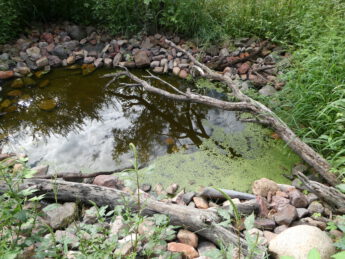The Urgent Need for More Backyard Habitat
In a time and era when the world, including Arizona, is losing so much habitat to development, overgrazing, mining, and other destructive forces we all need to collectively step up and help protect the magnificent Biodiversity of the Sky Islands.
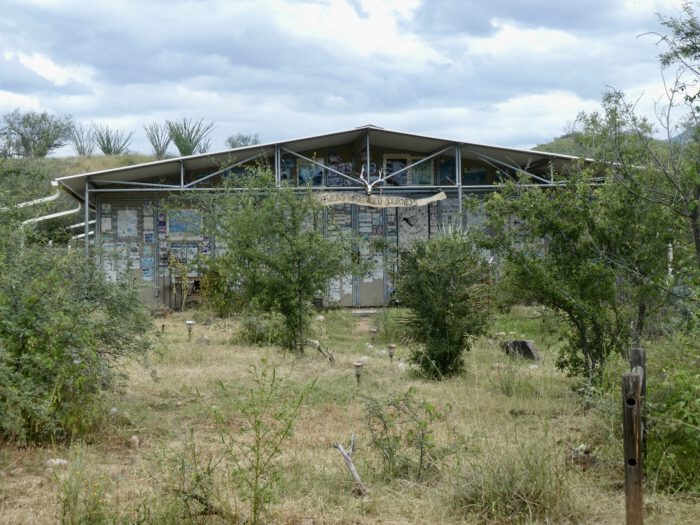 There is no better or more satisfying way to accomplish this lofty goal than to create and improve your own backyard habitat! In doing so, you will immensely benefit the native plant species with which you landscape, as well as many wildlife species dependent upon these plants and the other habitat features on your property. All of our yards added up equal a tremendous acreage of potential wildlife habitat. Help protect and preserve Sky Islands Biodiversity. This is one concrete way where we all can help!
There is no better or more satisfying way to accomplish this lofty goal than to create and improve your own backyard habitat! In doing so, you will immensely benefit the native plant species with which you landscape, as well as many wildlife species dependent upon these plants and the other habitat features on your property. All of our yards added up equal a tremendous acreage of potential wildlife habitat. Help protect and preserve Sky Islands Biodiversity. This is one concrete way where we all can help!
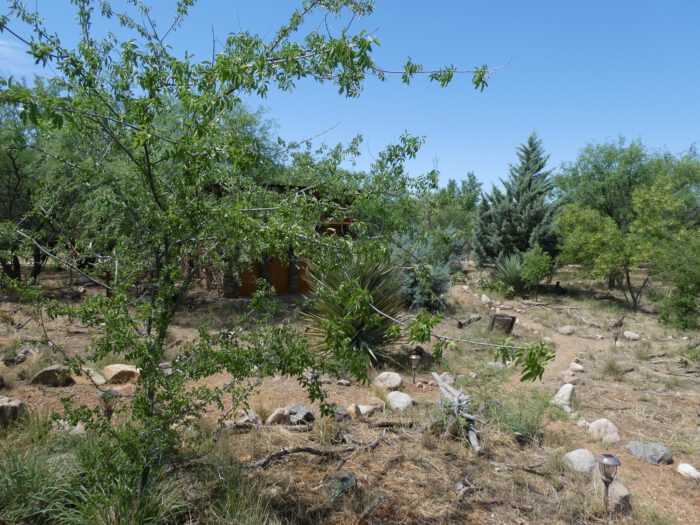
One of the main challenges and impediments to attracting wildlife to your home is the lack of knowledge. Many well-meaning, yet uninformed homeowners truly desire to help wildlife, yet lack the information as to how to accomplish this goal. Numerous people feed birds and other wildlife, yet this well-intentioned action may actually hurt wildlife populations rather than help them.
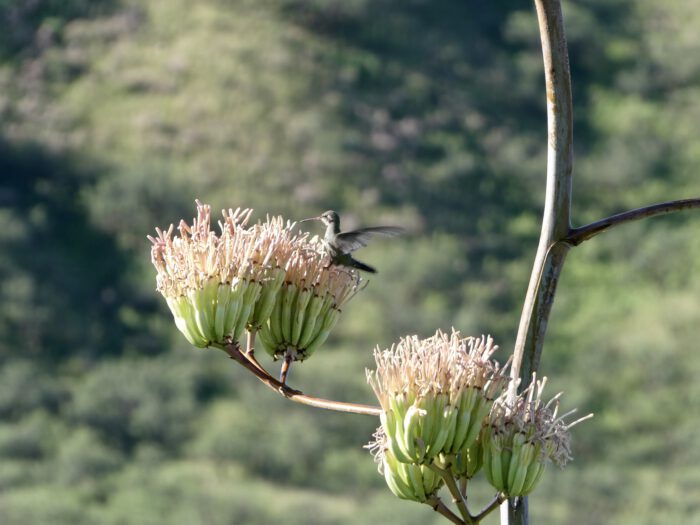
Here are some of the many reasons you should seriously consider NOT feed birds or other wildlife:
- Unnatural concentrations of wildlife can promote the spread of disease – even if you regularly clean your feeders – which many people do not.
- You are altering the natural behavior of many species, which instead of playing their normal ecological roles, are merely gorging themselves at your feeders.
- Studies on Hummingbirds, for example, indicate that ones using sugar water at your feeders only infrequently visit and hence pollinate various native wildflowers nearby
- Seed-eating and fruit-eating birds similarly may eat less of their wild foods, decreasing their value as seed dispersers
- Many birds drawn into feeders wind up hitting windows or buildings, causing injury or outright mortality
- The resources used to grow, protect, package, and transport you seed and other feeder food leaves a huge ecological footprint:
- Cleared land that grows monoculture crops, instead of hosting native habitat
- Pesticides and herbicides used to protect those crops (when is the last time you saw “organic” seed for sale?)
- Gas and other resources used to transport the bird/wildlife food to your locale
- Excess bird food often unnaturally concentrates rodents seeking the leftovers
The bottom line is this: If you truly desire to benefit a broad spectrum of native plants and wildlife, then there is no better way than to create a diverse and ecologically sound habitat all around your home.
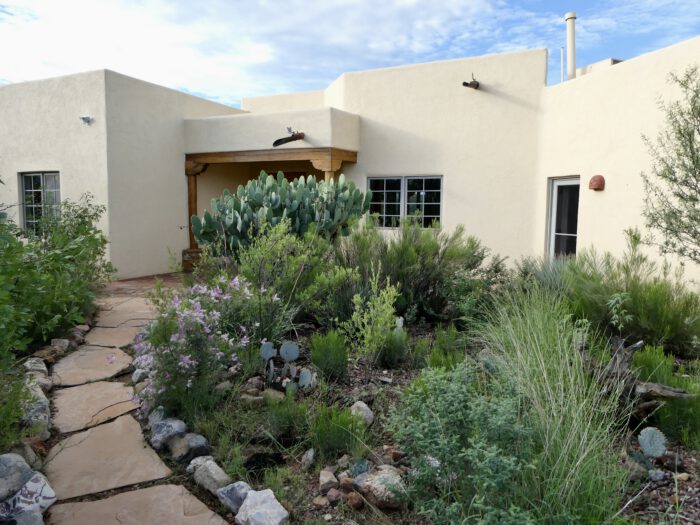
Here are some benefits to ponder when considering whether or not you would like to hire Ravens-Way Wild Journeys LLC to help create or improve wildlife habitat in your yard or land:
- For a modest investment, you will both greatly increase your property value and also help protect the unique Sky Islands Biodiversity
- Everyday you will enjoy the beauty, sights, smells, and sounds of a diverse native plant garden and all of the wildlife that it attracts
- You can lower your heating and cooling consumption immensely via proper landscaping
- Studies show that time spent in nature – in this case your own yard – helps reduce stress and is conducive to a peaceful existence

Consultation with Naturalist, Ethnobotanist, and Wildlife Biologist Vincent Pinto includes:
- Initial Meeting to understand your wishes
- A survey of your property’s existing habitat, including:
- Plants
- Wildlife
- Habitat Features
- Soils
- Aspects
- Slopes & Drainage
- Rainwater Harvesting potential
- A detailed species list of the flora, fauna, and habitat currently residing on your land
- Photos of your existing native plants with identification of each species. Nonnative plants on your land mostly do not benefit wildlife and almost always we recommend their replacement with native species.
- A list of the useful native plants on your land, including what they are useful for – edible plants, medicinal plants, ones that can make rope, etc…
- A detailed proposal w/ cost analysis for improving your backyard habitat:
- Lists of suggested native plants & the wildlife they are likely to attract
- Specific suggestions for various “target” wildlife groups, such as: Hummingbirds, Birds in general, Butterflies, Lizards, Mammals, etc…
- Other Recommended Habitat Alterations, such as water features, rock-scaping, etc…
- Xeriscaping ideas and recommendations
- Rainwater Harvesting suggestions
- Proposed Landscaping Map with the arrangement of would-be habitat features and plant species
- Recommendations to deal with any nonnative plants and “problem” wildlife species
- Identification of potentially dangerous plants and animals in your yard, as well as tips on coexisting with them and minimizing threats
- Proposals for removal of any harmful landscape elements – i.e. things that may harm native plants, wildlife, or your house

If you choose to proceed with our recommendations, then we will propose a schedule to create your Backyard Wildlife Habitat. When you choose to embark on habitat creation and restoration with professionals, then you know you will receive extraordinary results!

Implementation of your Backyard Habitat Plan includes:
- Installation of your backyard habitat, including native plants, water features, other habitat features
- Careful and thoughtful work, that minimizes any disturbances to your land
- We will leave you yard impeccable and looking beautiful right from the start
- A new map of your improved Backyard Habitat, including details of all that was installed
- Photos e-mailed to you of all the native plant species in your yard, including their human uses
- Recommendations for saving water in regards to your Backyard Wildlife Habitat
- A final walk-through of your new habitat, where Vincent will describe what each plant and habitat feature will likely attract to your yard.
- A 6-month and a 1-year follow-up visits to check on progress and to help insure your satisfaction with your Backyard Wildlife Habitat
Vincent’s Credentials:
Vincent has over 30 years of Sky Islands hands-on experience available to transform your backyard or land into a wildlife haven and a native plant habitat. As the owner and land manager of 2 extensive Nature Preserves in southeast Arizona, he knows what it takes to metamorphose a depauperate landscape into one hosting a myriad of wildlife, dependent upon a broad spectrum of native vegetation.
Here is some of Vincent’s pertinent experience:
- B.S. in Wildlife Biology
- Wildlife Researcher on a wide range of species, including:
- Northern Spotted Owl & Mexican Spotted Owl
- Western Yellow-billed Cuckoo
- Southwestern Willow Flycatcher
- Mexican Wild Turkey
- Reptiles & Amphibians in Missouri
- Mammals & other roadside wildlife in Maryland
- Wildlife Researcher on a wide range of species, including:
- Ongoing Habitat Restoration at 50-acre Raven’s Mountain Nature Sanctuary in the foothills of AZ’s Chiricahua Mountains, including Chihuahuan Desert Scrub and Grassland plant communities
- Ongoing Habitat Restoration and Management at 42-acre Raven’s Nest Nature Sanctuary by Sonoita Creek State Natural Area, including:
- Removal of nonnative plants & devising artful uses for them
- Passive and active Rainwater Harvesting Systems to benefit native plants
- Eco-friendly water features to attract and support wildlife
- Rock-scaping and other habitat features
- On-going species lists, documenting use of the wildlife habitat at Raven’s Nest
- Master’s Degree in Ethnobotany – human uses of native plants
- Broad knowledge of and experience in a wide variety of habitats in the Southwest and Sky Islands regions
- Vincent will choose the habitat features best suited to your exact location

Consulting Rates:
Please note that the rates below are for Consulting and therefore DO NOT include the labor for planting and creating your Backyard Habitat Plan:
- $100/hour for Initial Habitat Consultation on your land, for research time, and for your initial report
- minimum of 5 hours for your project is required, which includes field time and research/computer time
- $75/hour for Supervising the Implementation of your Wildlife Habitat Restoration Plan, exclusive of any materials costs, such as native plants, pond equipment, etc…
- minimum of 10 hours for your project is required



